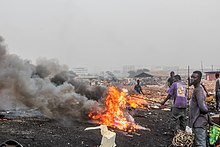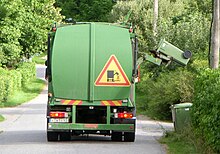Wet waste management
Waste management or waste disposal includes the processes and actions required to manage waste from its inception to its final disposal.[1] This includes the collection, transport, treatment and disposal of waste, together with monitoring and regulation of the waste management process and waste-related laws, technologies, economic mechanisms.

Waste can be solid, liquid, or gases and each type has different methods of disposal and management. Waste management deals with all types of waste, including industrial, biological, household, municipal, organic, biomedical, radioactive wastes. In some cases, waste can pose a threat to human health.[2] Health issues are associated throughout the entire process of waste management. Health issues can also arise indirectly or directly: directly through the handling of solid waste, and indirectly through the consumption of water, soil and food. Waste is produced by[3] human activity, for example, the extraction and processing of raw materials.[4] Waste management is intended to reduce adverse effects of waste on human health, the environment, planetary resources and aesthetics.
The aim of waste management is to reduce the dangerous effects of such waste on the environment and human health. A big part of waste management deals with municipal solid waste, which is created by industrial, commercial, and household activity.
Waste management practices are not uniform among countries (developed and developing nations); regions (urban and rural areas), and residential and industrial sectors can all take different approaches.[5]
Proper management of waste is important for building sustainable and liveable cities, but it remains a challenge for many developing countries and cities. A report found that effective waste management is relatively expensive, usually comprising 20%–50% of municipal budgets. Operating this essential municipal service requires integrated systems that are efficient, sustainable, and socially supported.[6] A large portion of waste management practices deal with municipal solid waste (MSW) which is the bulk of the waste that is created by household, industrial, and commercial activity.[7] According to the Intergovernmental Panel on Climate Change (IPCC), municipal solid waste is expected to reach approximately 3.4 Gt by 2050; however, policies and lawmaking can reduce the amount of waste produced in different areas and cities of the world.[8] Measures of waste management include measures for integrated techno-economic mechanisms[9] of a circular economy, effective disposal facilities, export and import control[10][11] and optimal






Comments
Post a Comment